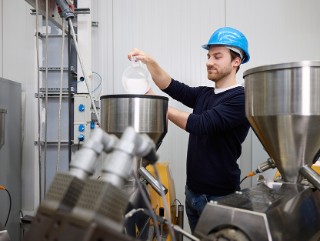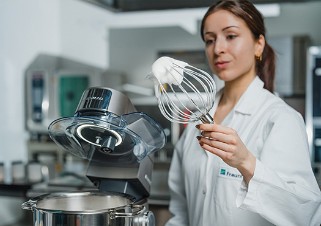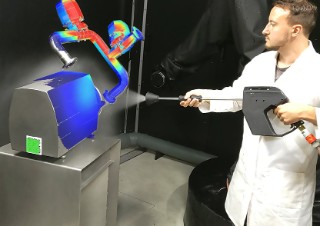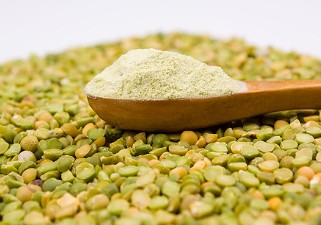Wood is extremely popular as a natural design element in interiors - whether as flooring, furniture or wall cladding. At the same time, modern glass façades and large windows ensure that rooms are flooded with light. However, daylight also brings harmful UV radiation into the interior, which leaves visible traces on wooden surfaces over time: Color changes, embrittlement and erosion are the result. To prevent these ageing processes, wooden surfaces are often treated with UV-protective coatings. Conventional solutions are often based on pigments, which provide effective protection against UV radiation but change the natural appearance of the wood. Alternatively, transparent UV blockers such as benzophenones are used - although their harmlessness to health is controversial. In the "ProTann" research project, scientists at the Fraunhofer IVV have developed a new, sustainable coating based on natural ingredients. The innovative solution combines UV-absorbing tannins with protein-based film formers - and impresses with excellent UV protection, very good film formation and health safety. The result: a modern, bio-based coating system for interior wood surfaces. The next step is to scale it up to industrial production levels. In the future, optimized water resistance should also make outdoor use possible. Would you like to make your coatings sustainable? Then find out more about our range. We will be happy to develop a customized, bio-based solution for your application!
more infoNews
-

When cutting joined materials - especially new sustainable packaging materials - the question often arises as to how optimum cutting edge quality can be ensured and which process parameters are decisive. In the "HotCut" research project, we have developed a testing device for detailed analysis of the cutting quality of joined packaging materials which for the first time establishes the connection between the "sealing" and "cutting" process steps. It records the interaction of key parameters such as cutting force, seam temperature and cutting speed and enables the derivation of an optimum process design. For example, tool geometries, sealing and cutting parameters as well as materials can be examined under industrial conditions with regard to cutting behavior, tool wear or cutting quality. For reproducible quality assurance, the device is suitable for carrying out standardized cutting tests and for developing test standards. Would you like to find out more?
more info -

We have developed new concepts for a sustainable circular economy for flexible plastic packaging in the European Horizon 2020 project "CIRCULAR Food Pack". Together with 10 companies and 5 research institutions, we have demonstrated successful strategies for implementing the ambitious goals of the new EU packaging regulation.
more info
Using innovative tracer-based sorting solutions, we have achieved a sorting purity of 99%. We tested the cleaning efficiency of the technologies used in the "CIRCULAR FoodPack" project in a challenge test. This showed that the Fraunhofer IVV's solvent-based recycling process was able to achieve a cleaning efficiency of up to 99.8% for both highly volatile and medium volatile contaminants and that scaling up the process opens up outstanding opportunities for the circular economy of food packaging. We realized up to 30% recycled content in the packaging structure developed for fexible mono-material packaging. We were able to reduce the migration of undesirable contaminants below toxicologically relevant threshold values. Using our demonstrator packaging (see photo) we successfully demonstrated the suitability of PE recyclate for blown film and for further processing into Machine Direction Oriented PE (MDOPE).
We will be happy to answer any questions you may have about the recycling of packaging. Please contact our recycling expert Dr. Martin Schlummer. We are also happy to support you in the development and testing of new packaging designs with PCR materials for food and personal & home care applications. -

We have reached an important milestone in plastics recycling and, together with Audi, we have successfully piloted the sorting of plastics from end-of-life vehicles. This will make it easier for car manufacturers to comply with the requirements of the European Vehicle Directive. This directive is currently being revised and stipulates that in future, 25% of the plastic weight in new vehicles must consist of post-consumer recycled plastics, with a quarter of this coming from end-of-life vehicles.
more info -

Bio-based polyesters have great potential to become an alternative to conventional plastics for the packaging, automotive and construction industries in times of resource scarcity, microplastic pollution and the increasing volume of plastic waste. So far, however, the most important biopolyesters such as PLA, PBS or PBAT still have deficits in terms of their thermal and mechanical properties as well as their barrier effect. In the CORNET project "FunBIOMAT", the packaging experts at the Fraunhofer IVV are now working together with the partners Fraunhofer UMSICHT, CELABOR and MATERIA NOVA to develop new functionalization methods for bio-based plastics. An important cornerstone is the optimal distribution of cellulose nanofibers in the materials. The Fraunhofer IVV is focusing on the core topics of coating, production of films and packaging demonstrators as well as testing the recyclability of the new materials. Would you also like to be part of this pioneering project in materials development? Then register with Dr. Marie Föllmer for the project support committee and join us at the next project meeting. We are also happy to support you in the development and improvement of your bio-based materials. Take advantage of our expertise in this area and get in touch with us!
more info -

Whether it's cinnamon buns, butter croissants or muffins, consumer demand for pastries is increasingly moving towards healthier, more sustainable or regional ingredients. This presents the baking industry with a major challenge, as the products should not differ from the original recipes in terms of taste or texture. This is where our scientists' many years of expertise in food development and reformulation come into play. The Fraunhofer IVV combines the latest scientific findings with practical applications to develop innovative processes. Prototypes can be produced and their quality precisely analyzed in our in-house food pilot plant. The focus here is on the optimal functionalization of raw materials. A particular highlight is the recently completed IGF project "LeguFoam" in which it was shown that protein foams as a substitute for animal protein are convincing in terms of both taste and texture.
more info
Are you still looking for a way to future-proof your baked goods recipes? Then contact our expert in development and reformulation of fine bakery products Dr. Maike Föste. -

Experience the latest technologies for the cosmetics industry at CosmeticBusiness 2025 in Munich from June 4–5! Visit us in Hall 2, Booth A31, where we will present: Cosmetics that Make an Impact: Discover how texture, scent, and packaging influence the perception of cosmetics – and experience live how EEG technology makes emotions triggered by skin feel and fragrance visible. Efficient Production: Enhance production quality with virtual reality training and adaptive cleaning systems. Modern sensor technologies monitor production and cleaning processes in real time. Exclusive Expert Talk: "Transparency in Cosmetics – Scientifically Proven Effects" on June 4, 2025, from 1:40 to 2:00 p.m. with Prof. Dr. Jessica Freiherr. Visit us and explore innovations that make cosmetics production smarter and more efficient!
more info -

At IFFA 2025 in Frankfurt am Main, the Fraunhofer Institute for Process Engineering and Packaging IVV will present innovative cleaning technologies: "CleanAssist": A cleaning lance with digital assistance and precise documentation. "Exo-MCD": An autonomous cleaning robot for automated cleaning of production areas. "CoControl-LumiHD": An inline contamination sensor for real-time monitoring of soiling. Visit us from May 3-8, 2025, in Hall 11, Booth C31, and discover how these solutions can make your cleaning processes more efficient and future-proof.
more info -

With the help of rapid systems based on semiconductor sensors, quality deviations in food can be detected immediately. We developed these innovative sensor technologies in the joint project "SHIELD - Safe domestic (organic) food through sensory detection methods", which is funded by the Bavarian Research Foundation. The rapid systems enable a comprehensive analysis and control of the quality and safety of organic food and products from the moment the goods are received right through to the corresponding further processing of the products.
more info -

In the Leg4Future project, lentils and mung beans take center stage as we explore new, sustainable sources of plant-based proteins. While lentils are already cultivated in Germany and are valued for their appealing sensory properties, mung beans are still relatively uncommon in this region. However, due to their high potential, Novel Food status, and favorable physicochemical properties, mung beans are exceptionally well-suited for innovative food applications. The project aims to produce techno-functional protein concentrates using fermentation processes, reduce antinutritional components, and scale up the processes to industrial level in our in-house pilot plant. At the same time, the cultivation of promising, yet underutilized legume species is being promoted.
more info
 Fraunhofer Institute for Process Engineering and Packaging IVV
Fraunhofer Institute for Process Engineering and Packaging IVV